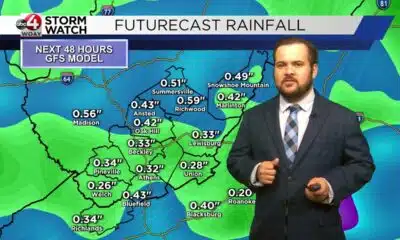News from the South - Alabama News Feed
Fires and floods are eviscerating US communities, intensifying the housing crisis • Alabama Reflector
Fires and floods are eviscerating US communities, intensifying the housing crisis
by Robbie Sequeira, Alabama Reflector
February 8, 2025
This story originally appeared on Stateline.
After nearly a month, the Eaton and Palisades wildfires that ravaged California have been contained. But for Southern California and state agencies, another challenge lies ahead: helping people find homes.
The wildfires levied significant long-term damage, with thousands of homes destroyed, billions in damages and a worsening of the state’s housing and homelessness crises. Even before the fires, California already had a shortage of 1.2 million affordable homes, with Los Angeles County alone facing a deficit of 500,000 units.
“This tragic loss will certainly make the housing crisis more acute in multiple ways,” said Ryan Finnigan, an associate research director at the Terner Center for Housing Innovation at the University of California, Berkeley. “L.A. continues to need vastly more affordable housing, and people displaced from lost affordable units might need the most support to become stably housed again.”
GET THE MORNING HEADLINES.
Even those displaced from market-rate or high-end housing will face challenges in an already tight market, with thousands searching for housing at once — likely driving prices even higher for everyone.
Natural disasters are worsening the U.S. housing crisis, upending the home insurance market, and reducing housing options — particularly for lower-income residents. And that trend will likely grow as disasters become more frequent and severe.
Climate change, experts warn, is the world’s fastest-growing driver of homelessness, displacing millions of people annually. In 2022 alone, disasters forced 32.6 million people worldwide from their homes, according to a 2023 report by the Internal Displacement Monitoring Centre.
If trends continue, 1.2 billion people globally could be displaced due to disasters by 2050, according to the international think tank Institute for Economics & Peace.
The consequences are already playing out.
After the 2023 Maui wildfires, homelessness in Hawaii rose by 87%. With Los Angeles’ fires destroying about six times as many homes, experts predict that California’s homeless population will surge dramatically in 2025.
“Natural disasters cause a massive spike in homelessness,” said Jeremy Ney, a macroeconomics policy strategist who studies American inequality. “The primary goal of relief organizations like the Red Cross is to prevent people from becoming permanently unhoused — but for many, it can take a decade or more to recover.”
A long path to recovery
According to the Migration Policy Institute, 3.2 million U.S. adults were displaced or evacuated because of natural disasters in 2022, with more than 500,000 still unable to return home by the end of the year.
The recovery timeline can be grueling. In North Carolina, state officials managing Hurricane Helene’s recovery warned that key federal funding for home reconstruction could be delayed for months — possibly into next fall, according to NC Newsline.
In the event of a disaster, the Federal Emergency Management Agency, known as FEMA, focuses on shorter-term relief, offering emergency shelters, disaster unemployment assistance and grants for rebuilding. State agencies, though, are tasked with the long-term projects, such as making infrastructure repairs and developing housing initiatives, said Samantha Batko, a senior fellow in the Housing and Communities Division at the Urban Institute.
“Disaster relief programs like FEMA focus on short-term recovery, whereas homelessness response systems struggle with long-term systemic challenges,” said Batko. “People who live in unsheltered places during disasters, like on street corners or in cars, have higher exposure to ash [from fires] and debris, which leads to more health issues and emergency room visits.”
At the time of the Eaton fire, Los Angeles’ Skid Row was home to roughly 2,200 unsheltered people, experiencing some of the worst air quality effects, according to Batko, who co-authored a report on the issue for the institute.
Los Angeles’ homelessness crisis was already dire: Last year, Los Angeles County had just 27,000 shelter beds for 75,000 unhoused residents. The fires have now left thousands more without homes, further straining an already overwhelmed system.
“The relevant governments — state and federal agencies, L.A. County and its 88 cities — must be on the same page to mount an organized and effective response,” said Finnigan, of the Terner Center for Housing Innovation.
There may be another twist coming.
When President Donald Trump visited western North Carolina last month, he floated the idea of eliminating FEMA and leaving disaster response to the states, with federal reimbursement of some costs. He has since signed an executive order calling for a full assessment of FEMA and recommendations for “improvements or structural changes.” State emergency managers quickly responded that they need FEMA’s involvement.
Insurance challenges
Disaster recovery is not equal: Homeowners with insurance typically rebound the fastest, as policies cover much of the rebuilding costs. But as climate disasters intensify, the insurance market has begun to unravel. In 2023, insurers lost money on homeowners’ coverage in 18 states — more than a third of the country — according to a New York Times analysis.
It’s led to an insurance crisis — rising premiums, reduced coverage or insurers pulling out altogether — a trend that began in California, Florida and Louisiana but that has spread across the country.
Even before this winter’s fires, these insurance issues would have been a defining legislative issue for California, predicted Alexandra Alvarado, director of education and marketing at the American Apartment Owners Association, an industry lobbying group.
“There’s a great anxiety from … property owners on whether they will be insured or covered when another wildfire or a similar event costs them their home, and whether it’s worth it to rebuild and start over,” Alvarado told Stateline in December. “I think it’s going to be on the radar of lawmakers not just in our state, because we’re seeing this play out in other states as well.”
During the fires, California Insurance Commissioner Ricardo Lara reminded insurers of their legal duty to cover mudslide damage caused by recent wildfires, as colder, wetter weather raises risks, particularly for Los Angeles County wildfire survivors.
Already, State Farm, the largest home insurer in California, has asked the state to approve “emergency” rate hikes because of the fires, seeking an average 22% increase for homeowners and 15% for renters.
Barriers for lower-income residents
The long-term recovery process is filled with hurdles — especially for low-income and marginalized communities.
Lower-income households are disproportionately vulnerable to climate disasters; they’re also disproportionately harmed. Residents may reside in older, high-risk homes that are more susceptible to destruction. In some places, lower-income neighborhoods were built in low-lying flood plains because land was cheaper or red-lining kept families of color from living elsewhere.
Many households cannot afford homeowners or flood insurance, and strict eligibility criteria may prevent them from qualifying for disaster relief loans, said Katie Arrington, a disaster recovery expert for Boulder County, Colorado.
Natural disasters cause a massive spike in homelessness.
– Jeremy Ney, a macroeconomics policy strategist
Renters, mobile home residents and uninsured households often can’t afford homes comparable to the ones lost to disaster. Without financial safety nets, many displaced residents face an impossible choice: endure months or years of instability, or leave their community altogether.
“People with insurance have an easier time recovering than people without it. Homeowners, in general, recover more easily than renters,” Arrington said. “There’s a spectrum, from homeowners with full insurance to renters without insurance, and each group faces very different recovery timelines.”
One major barrier to recovery for renters is the post-disaster surge in housing costs. A Brookings Institution report published in October 2023 shows that effective rents typically rise 4% after a disaster and remain elevated for at least five years.
In the past few weeks in Los Angeles, fire-affected neighborhoods such as Venice and Santa Monica saw rents surge by 60-100% within days, fueling calls for stronger enforcement of California’s anti-price gouging laws.
California lawmakers in January allocated billions in funding to state and federal government relief efforts and put an immediate moratorium on evictions. The governor’s office also has issued an executive order prohibiting Los Angeles-area landlords from evicting tenants who provide shelter to survivors of the Los Angeles-area firestorms.
Experience and luck
For many municipalities, past experience is the only real preparation for disaster recovery. And sometimes, a bit of luck helps, too.
In 2021, the Marshall Fire in Colorado forced the evacuation of 35,000 residents in Boulder County and destroyed nearly 1,000 buildings. County officials say their response benefited from both preparation and circumstance.
“Some of our success was due to experience, but some of it was luck. We had a vacant county-owned building available to house the disaster assistance center, which allowed us to act quickly,” said Arrington, the disaster response manager for Boulder County. “If we had needed to rent or find a less-central location, the response would have been slower.”
Across the U.S., states are grappling with similar challenges.
In North Carolina, state-led efforts such as the Back@Home program helped rapidly rehouse approximately 100 displaced households after Hurricane Florence in 2018, and later helped nearly 800 households find more permanent homes. The program has since become a model for addressing disaster-fueled displacement.
Similarly, after Tropical Storm Helene last fall, Asheville, North Carolina, allocated $1 million in rental assistance to prevent displacement. While Red Cross and state-run shelters were scheduled to close by Nov. 10, the city coordinated with the WNC Rescue Mission to keep one shelter open longer for the remaining displaced residents.
By Dec. 31, 2024, all nine remaining shelter participants had secured exit plans — ensuring no one was left without a place to go, according to the city’s spokesperson, Kim Miller.
Hawaii also has launched large-scale relief initiatives. In response to the 2023 Maui fire, HomeAid Hawaii, in partnership with the state, developed interim housing solutions for 1,500 displaced residents for up to five years.
“Disaster-driven homelessness requires targeted programs that meet the needs of people at risk,” said Batko, of the Urban Institute. “States must integrate housing policy into emergency preparedness, or they’ll find themselves overwhelmed when the next disaster strikes.”
In Colorado, Boulder County has managed to rebuild or begin construction on about two-thirds of the homes that were lost.
Boulder County is aiming for an ambitious 90% recovery rate, meaning 9 of 10 displaced households will find a new homes in the area. But even that success comes with a twinge of mourning for what was lost.
“We started this recovery with a goal to get close to 90%, so we’re proud,” Arrington said. “But we also recognize that some parts of the community have changed forever.”
Stateline is part of States Newsroom, a nonprofit news network supported by grants and a coalition of donors as a 501c(3) public charity. Stateline maintains editorial independence. Contact Editor Scott S. Greenberger for questions: info@stateline.org.
YOU MAKE OUR WORK POSSIBLE.
Alabama Reflector is part of States Newsroom, a nonprofit news network supported by grants and a coalition of donors as a 501c(3) public charity. Alabama Reflector maintains editorial independence. Contact Editor Brian Lyman for questions: info@alabamareflector.com.
The post Fires and floods are eviscerating US communities, intensifying the housing crisis • Alabama Reflector appeared first on alabamareflector.com
News from the South - Alabama News Feed
Alabama's Back-to-School Sales Tax Holiday returns: Which items are eligible
SUMMARY: Alabama’s Back-to-School Sales Tax Holiday runs through Sunday, allowing families to purchase specific items tax-free. Eligible items include clothing under $100 (boots, diapers, jackets, jeans, uniforms), school supplies under $50 (binders, crayons, glue, pens, pencils), computers under $750, and books under $30. This tax break helps lower-income families save money, as they typically spend a larger portion of their income on school supplies. The holiday provides temporary relief from sales tax, making back-to-school shopping more affordable. A complete list of eligible items is available on the Alabama Department of Revenue website and WVTM 13’s site.
Alabama’s Back-to-School Sales Tax Holiday returns: Which items are eligible
Subscribe to WVTM on YouTube now for more: https://bit.ly/2jvAaUD
Get more Birmingham news: http://www.wvtm13.com
Like us: https://www.facebook.com/WVTM13/
Follow us: https://twitter.com/WVTM13
Instagram: https://www.instagram.com/wvtm13/
News from the South - Alabama News Feed
Loving Memories of Autumn Strickland | July 17, 2025 | News 19 at 6 p.m.
SUMMARY: Friends and loved ones of Autumn Strickland, the woman tragically abducted and killed in May, are honoring her vibrant spirit and generous heart. Known for her bold energy, love of horses, and deep loyalty, Autumn was a devoted mother, daughter, sister, and friend. She cherished time at the barn, helping others, and expressing love openly—even during her school years. Her two-year-old daughter Aspen survives her, while her son Lane passed away at age five. Friends remember Autumn’s fearless, compassionate nature and are committed to keeping her memory alive, especially for Aspen, hoping she will grow up knowing her mother’s love and strength.
Childhood and lifelong friends of Autumn Strickland spoke exclusively to News 19 about how they want her memory to live on …
News from the South - Alabama News Feed
Democrats walk out on US Senate Judiciary vote on Trump judicial nominee Emil Bove
by Ashley Murray, Alabama Reflector
July 17, 2025
WASHINGTON — Despite a walkout from Democrats, Senate Republicans tasked with vetting nominees to the federal bench on Thursday claimed to advance President Donald Trump’s former criminal defense attorney, Emil Bove, one step closer to a spot on the U.S. Appeals Court that handles cases in Delaware, New Jersey, Pennsylvania and the U.S. Virgin Islands.
A spokesperson for Republican Sen. Chuck Grassley, who chairs the Senate Committee on the Judiciary, told States Newsroom the panel approved Bove’s nomination in a 12-0 vote — that is, despite panel rules that state “at least two members of the minority” must be present to transact committee business. The Iowa Republican’s office did not immediately respond to a follow-up question about committee rules.
In a show of opposition, all Democratic members of the panel, with the exception of Democratic Sen. Cory Booker, stood up and left as Republicans on the panel cast “aye” votes to push Bove’s nomination to the full Senate.
Booker, of New Jersey, refused to stop speaking as Grassley called the vote.
“You are a decent man. Why are you doing this?” Booker protested.
In a post on social media following the meeting, Josh Sorbe, press secretary for the committee’s minority, wrote: “Shameful day in Senate Judiciary. Republicans broke numerous committee rules, ignored privileged motions, denied debate, and rushed through judicial nominees without real vetting. Sen. BOOKER admonished them for it, and Democrats denied quorum and walked out.”
Illinois Sen. Dick Durbin, the top Democrat on the panel, later issued a statement acknowledging the vote took place, but maintained Senate Republicans broke committee rules by ignoring Booker’s request for further debate and moving ahead with the vote.
“Chairman Grassley claimed that he was following Committee precedent. This is simply untrue,” Durbin said.
Questions about bribery charges, Jan. 6
Senate Democrats, former judges and advocates opposed Bove’s nomination over what they describe as unethical behavior, including questions about his role as a top Department of Justice official in the dismissal of federal bribery charges against New York City Mayor Eric Adams and in the firing of prosecutors who worked on cases probing the Jan. 6, 2021, storming of the U.S. Capitol.
Critics also pointed to recent whistleblower accusations that Bove suggested ignoring a federal court order limiting Trump’s mass deportation campaign.
Bove represented Trump in his multiple federal criminal cases in 2023 and 2024, as well as in a New York state trial that ended in Trump’s conviction on 34 felonies for falsifying business records.
Trump appointed Bove as acting attorney general on his first day in office, and Bove shifted to principal associate deputy upon Attorney General Pam Bondi’s confirmation.
Bove’s nomination to a lifetime appointment on the U.S. Court of Appeals for the 3rd Circuit has been overshadowed by a whistleblower’s account alleging Bove told subordinates to consider defying a federal court order halting Trump’s deportation flights to El Salvador in March.
Both Bove and acting Attorney General Todd Blanche, another of Trump’s former criminal defense attorneys, deny the allegations.
Grassley said Thursday prior to the vote that allegations against Bove “frankly crossed the line.”
“What we’re witnessing has all the hallmarks of a political hit job,” Grassley said.
Illinois’ Sen. Dick Durbin, the top Democrat on the panel, said in his opening statement Thursday that Bove “should not be seriously considered by the Senate for a lifetime appointment to the federal bench.”
“He led this administration’s embarrassing efforts to strike a corrupt bargain with New York City Mayor Eric Adams, and he has been trailed by a history of complaints, long predating his affiliation with President Trump, about his temperament, his poor judgment and lack of candor before the court,” Durbin said.
Whistleblower complaint
Durbin and fellow minority committee members requested the panel hear testimony from Erez Reuveni, a former senior DOJ official who filed a whistleblower complaint in which he alleged he was fired for refusing to follow department orders to undermine the courts in Trump’s deportation cases.
In the complaint submitted to the DOJ inspector general and Congress, Reuveni, who spent 15 years with the department, outlined “a pattern of deliberate defiance of federal court rulings related to immigration enforcement,” according to a summary from the Government Accountability Project and Gilbert Employment Law P.C., which filed the complaint on Reuveni’s behalf.
Lawmakers who viewed the complaint said Reuveni recounted witnessing Bove suggesting the DOJ might need to tell the courts “f— you” in relation to any order blocking the administration from sending planes full of deported migrants to El Salvador under the Alien Enemies Act.
“Mr. Reuveni has made credible allegations against Mr. Bove, which, if true, clearly disqualify him for a lifetime appointment to the federal bench. Thus, it is imperative that the Committee hear from Mr. Reuveni, under oath, before we vote on Mr. Bove’s nomination,” according to a letter Monday led by Durbin.
Grassley shut down the request Tuesday, writing in a response that documents provided by the minority to support the claim do not “substantiate any misconduct by Mr. Bove.”
“I respect whistleblowers and the whistleblowing process and have taken this matter seriously. I note that the available documents and the public record are inconsistent with some of the whistleblower’s assertions, which have been reviewed in good faith,” Grassley wrote.
Dozens of former judges protest nomination
More than 80 former federal and state judges described Bove’s nomination as a “disservice to the constitution, to law enforcement and to the rule of law” in a letter to Grassley and Durbin Tuesday.
The judges, including former 4th Circuit Judge Michael Luttig, a George H. W. Bush appointee who endorsed Vice President Kamala Harris last year, slammed Bove’s “egregious record of mistreating law enforcement officers, abusing power, and disregarding the law itself,” adding that the allegations disqualify him for the position.
The letter cited Bove’s alleged role in firing Federal Bureau of Investigation agents and DOJ officials who prosecuted those involved in storming the U.S. Capitol on Jan. 6, 2021. Trump pardoned all of the nearly 1,600 Jan. 6 defendants on the first night of his second term, including the most violent convicted felons.
The former judges also called Trump’s nomination of his personal defense attorney to a federal judgeship “deeply inappropriate.”
“In fact, when President Trump nominated Bove, he posted on social media that Bove would ‘do anything else that is necessary to, MAKE AMERICA GREAT AGAIN.’ That statement underscores the peril of confirming a nominee whose principal qualification appears to be personal loyalty to the president,” the former judges wrote.
Lena Zwarensteyn, senior director of the fair courts program at The Leadership Conference on Civil and Human Rights, said the list of concerns over Bove’s nomination “goes on and on and on.”
“I think when it comes down to it, you know, in a lifetime position that requires good judgment, wise discretion, good temperament and the dedication to the rights of all, Mr. Bove fails on every single one of those accounts,” Zwarensteyn told States Newsroom in an interview Wednesday.
GOP Sen. Thom Tillis of North Carolina, who announced his retirement after breaking ranks earlier this month on Trump’s budget reconciliation package, said Thursday he found nothing to prove Bove expressed support for Jan. 6 defendants — something that would have been a “red line,” he said.
“The fact of the matter is, I can’t find one piece of evidence where he said that the violent act against police officers were okay or condoned. If you find it, let me know,” Tillis said.
Bove, of Seneca Falls, New York, graduated from Georgetown University Law in Washington, D.C., in 2008. He clerked for Judge Richard J. Sullivan of the Southern District of New York, and Judge Richard C. Wesley, who now sits on the U.S. Court of Appeals for the 2nd Circuit.
Bove, 44, worked as a federal prosecutor in the U.S. attorney’s office for the Southern District of New York, and in 2023 became a partner at Blanche Law, the private firm of Todd Blanche.
Tense confirmation hearing
Democratic senators, and in some cases Republicans, peppered Bove with questions and concerns about the numerous misconduct allegations during the Judiciary Committee’s June 25 confirmation hearing.
Booker said he remained worried about a “pattern of behavior” first reported by Politico in February regarding complaints about Bove’s temper from former colleagues in the U.S. attorney’s office for the Southern District of New York.
“The allegations align with reports about your abuse of power now at the DOJ,” Booker said.
Sen. John Kennedy, a Louisiana Republican, pressed Bove on why the DOJ dismissed the federal corruption case against the New York mayor, who was charged with accepting illegal campaign contributions and luxury travel in exchange for favors.
The Trump administration moved to dismiss the Adams case in February, arguing the case interfered with the mayor’s ability to carry out immigration enforcement in the city. The administration requested a dismissal without prejudice — meaning Adams could be prosecuted again — but a federal judge ultimately dismissed the case in April with prejudice, citing concerns the White House would have leverage over Adams’ policy decisions.
“Do you believe in a higher being?” Kennedy asked Bove.
“It’s a very personal question, Senator, but I do,” Bove responded.
“I want you to look me in the eye and swear to your higher being when you answer this question, did you make a deal, a political deal, and dismiss the charges against Mayor Adams?” Kennedy said.
“Absolutely not,” Bove answered.
Alabama Reflector is part of States Newsroom, a nonprofit news network supported by grants and a coalition of donors as a 501c(3) public charity. Alabama Reflector maintains editorial independence. Contact Editor Brian Lyman for questions: info@alabamareflector.com.
The post Democrats walk out on US Senate Judiciary vote on Trump judicial nominee Emil Bove appeared first on alabamareflector.com
Note: The following A.I. based commentary is not part of the original article, reproduced above, but is offered in the hopes that it will promote greater media literacy and critical thinking, by making any potential bias more visible to the reader –Staff Editor.
Political Bias Rating: Center-Left
This article presents the nomination of Emil Bove with a critical tone largely aligned with Democratic perspectives and concerns. It emphasizes allegations of misconduct, ethical questions, and opposition from Democrats and former judges, while providing Republican statements primarily as counterpoints or defenses. The framing highlights criticism of the nominee’s ties to former President Trump and portrays Senate Republicans as pushing the nomination amid procedural disputes. Although the article reports statements from both sides, the overall emphasis on Democratic objections and allegations suggests a center-left leaning in coverage, reflecting skepticism toward the nominee and the Republican-led process.
-
News from the South - Tennessee News Feed5 days ago
Bread sold at Walmart, Kroger stores in TN, KY recalled over undeclared tree nut
-
News from the South - Arkansas News Feed7 days ago
Man shot and killed in Benton County, near Rogers
-
News from the South - Georgia News Feed1 day ago
Aiken County family fleeing to Mexico due to Trump immigration policies
-
News from the South - Alabama News Feed6 days ago
Girls Hold Lemonade Stand for St. Jude Hospital | July 12, 2025 | News 19 at 10 p.m. – Weekend
-
News from the South - Louisiana News Feed7 days ago
‘Good Trouble’ comes to New Iberia – The Current
-
News from the South - Georgia News Feed7 days ago
Anti-ICE demonstrators march to Beaufort County Sheriff's Office
-
News from the South - Oklahoma News Feed7 days ago
Police say couple had 50+ animals living in home
-
Mississippi Today4 days ago
Coast judge upholds secrecy in politically charged case. Media appeals ruling.











































